Finance
China’s automakers must adapt quickly or lose out on the EV boom
Published
2 weeks agoon
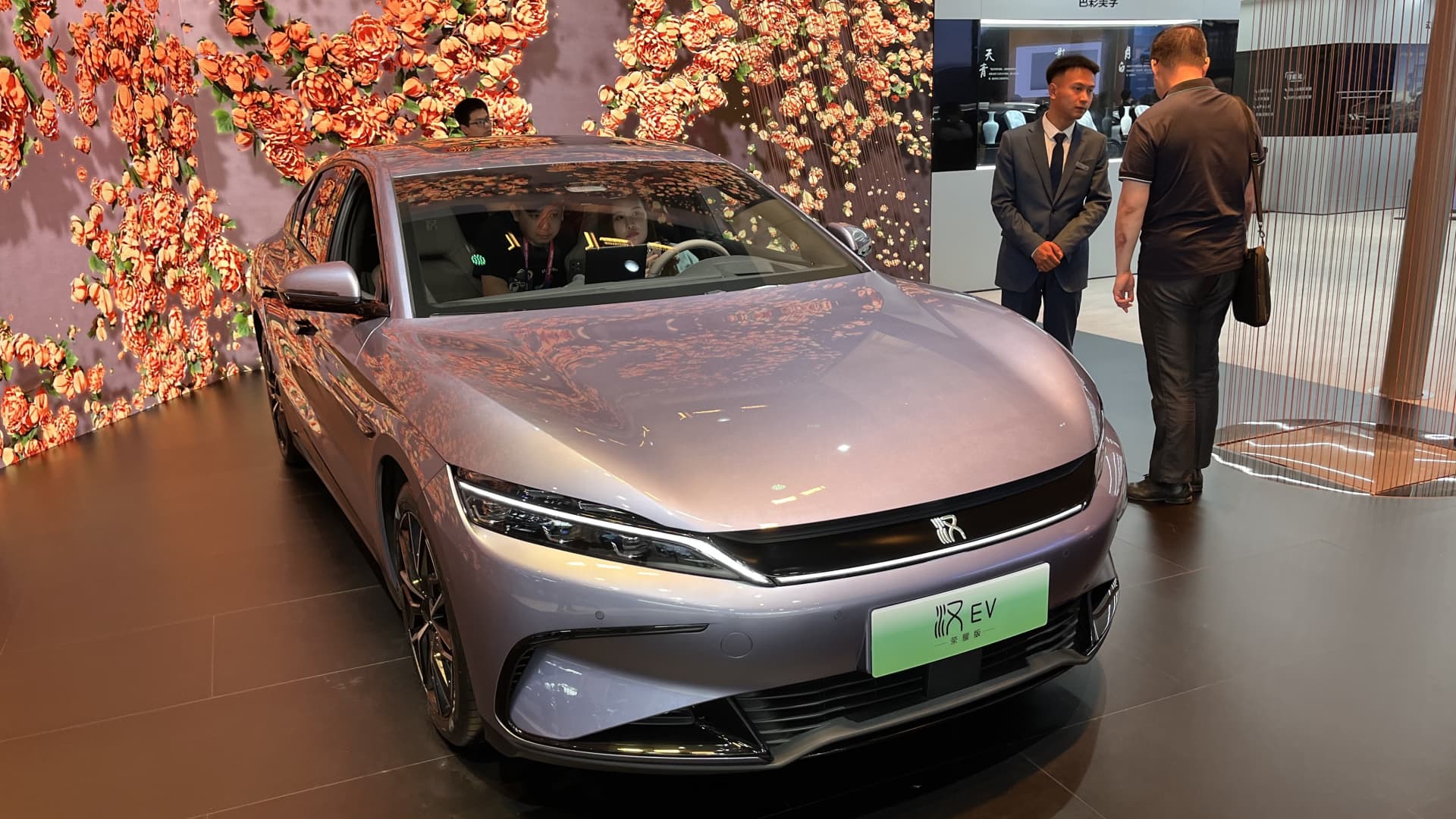
Chinese new energy vehicle giant shows off the latest version of its Han electric sedan at the Beijing auto show on April 26, 2024.
CNBC | Evelyn Cheng
BEIJING — Chinese automakers, including state-owned auto giant GAC Group, can’t afford to take it easy in the country’s electric car boom if they want to survive.
Adoption of battery and hybrid-powered cars has surged in China, but an onslaught of new models has fueled a price war that’s forced Tesla to also cut its prices. While Chinese automakers also look overseas for growth, other countries are increasingly wary of the impact of the cars on domestic auto industries, requiring investment in local production. It’s now survival of the fittest in China’s already competitive EV market.
“The speed of elimination will only pick up,” Feng Xingya, general manager at GAC, told reporters on the sidelines of the Beijing auto show in late April. That’s according to a CNBC translation of his Mandarin-language remarks.
GAC slashed prices on its cars one week before the May 1 Labor Day holiday in China, Feng said, noting the price war contributed to its first-quarter sales slump. The automaker’s operating revenue fell year-on-year in the first quarter for the first time since 2020, according to Wind Information.
To stay competitive, Feng said GAC is partnering with tech companies such as Huawei, while working on in-house research and development. The automaker is the joint venture partner of Honda and Toyota in China, and has an electric car brand called Aion.
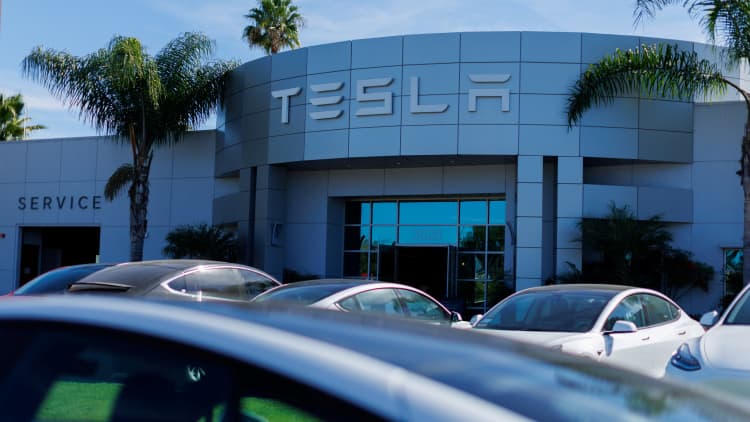
“In the short term, if your product isn’t good, then consumers won’t buy it,” Feng said. “You need to use the best tech and the best products to satisfy consumer needs. In the long term, you must have a core competitive edge.”
Expanding outside China
Like other automakers in China, GAC is also turning overseas. Domestic sales of new energy vehicles, which include battery-only and hybrid-powered cars, have slowed their pace of growth as of March, versus December, according to China Passenger Car Association data.
Last year, GAC revamped its overseas strategy with an ultimate goal of selling 1 million cars abroad — electric, hybrid and fuel-powered, Wei Haigang, general manager of GAC’s international automobile sales and services business, told CNBC in an interview last week.
The company still has a long way to go. It only exported about 50,000 cars last year, Wei said. But he said the goal is to double that to at least 100,000 vehicles this year, and reach 500,000 units by 2030 — with sales targets and strategies for different regions of the world, beginning with the Middle East and Mexico.
“We are now going all out to speed up our overseas expansion,” he said in Mandarin, translated by CNBC.
China’s overseas car sales surged last year, putting the country on par with Japan as the world’s largest exporter of cars. The EU and the U.S. have in the last year announced probes into China-made electric vehicles, amid efforts to encourage consumers to shift away from fuel-powered cars.
Factories go global
Part of GAC’s international strategy is to localize production, Wei said, noting the company is using a variety of approaches such as joint ventures and technology partnerships. He said GAC opened a factory in Malaysia in April and plans to open another in Thailand in June, with Egypt, Brazil and Turkey also under consideration.
GAC plans to establish eight subsidiaries this year, including in Amsterdam, Wei said. But the U.S. isn’t part of the company’s near-term overseas expansion plans, he said.
The difference today is that the overcapacity now has come together with vehicles that are very competitive
Stephen Dyer
AlixPartners, co-leader of the Greater China Business
U.S. and European officials have in recent months emphasized the need to address China’s “overcapacity,” which can be loosely defined as state-supported production of goods that exceeds demand. China has pushed back on such concerns and its Ministry of Commerce claimed that, from a global perspective, new energy faces a capacity shortage.
“There’s always been overcapacity in the Chinese auto industry,” said Stephen Dyer, co-leader of the Greater China business at consulting firm AlixPartners, and Asia leader for its automotive and industrials practice.
“The difference today is that the overcapacity now has come together with vehicles that are very competitive,” he told CNBC on the sidelines of the auto show. “So in our EV survey I was surprised to find that about 73% of U.S. consumers could recognize at least one Chinese EV brand. And Europe was close behind.”
Dyer expects that to drive overseas demand for Chinese electric cars. AlixPartners’ survey found that BYD had the highest brand recognition across the U.S. and major European countries, followed by Nio and Leap Motor.
BYD exported 242,000 cars last year and is also building factories overseas. The company’s sales are roughly split between hybrid and battery-powered vehicles. BYD no longer sells traditional fuel-powered passenger cars.
Tech competition
In addition to price, this year’s auto show in Beijing reflected how companies — Chinese and foreign — are competing on tech such as driver-assist software.
Chinese consumers placed almost twice as much importance on tech features compared with U.S. consumers, Dyer said, citing AlixPartners’ survey.
He noted how Chinese startups are so aggressive that a car may be sold with new tech, even if the software still has problems. “They know they can use over-the-air updates to rapidly fix bugs or add features as needed,” Dyer said.
Interest in tech doesn’t mean consumers are sold on battery-only cars. Dyer said that in the short term, consumers are still worried about driving range — meaning that hybrids are not only in demand, but often used without charging the battery.
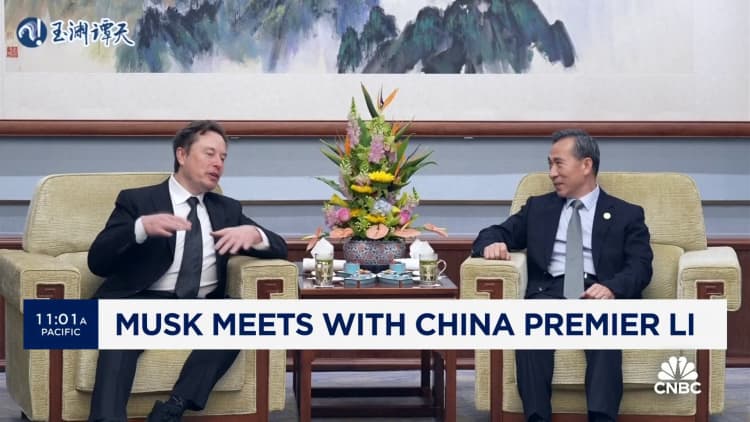
Even Volkswagen is getting in on the “smart tech” race. The German auto giant revealed at the auto show its joint venture with Shanghai’s state-owned SAIC Motor teamed up with Chinese drone company DJI’s automotive unit to create a driver-assist system for the newly launched Tiguan L Pro.
The initial version of the SUV is fuel-powered, for which the company’s tagline is: “oil or electric, both are smart,” according to a CNBC translation of the Chinese.
Battery manufacturer CATL had a more prominent exhibition booth this year, likely in the hope of encouraging consumers to buy cars with its batteries, as competitors’ market share grows, said Zhong Shi, an analyst with the China Automobile Dealers Association.
Automotive chip companies Black Sesame and Horizon Robotics also had booths inside the main exhibition hall.
What customers want
Lotus Technology, a high-end U.K. car brand acquired by Geely, found in a survey of its customers their top requests were for automatic parking and battery charging, which would allow drivers to stay in the car.
That’s according to CFO Alexious Kuen Long Lee, who spoke with CNBC on the sidelines of the Beijing auto show. He noted the company now has robotic battery chargers in Shanghai.
Lotus and Nio last week also announced a strategic partnership on battery swapping and charging.
“I think there is a handing over of the baton where the Chinese brands are becoming much bigger and much stronger, and the foreign brands are still trying to decide what’s the best energy route,” said Lee, who’s worked in China since 1998. “Are they still deciding on the PHEV, are they still thinking about BEVs, are they still thinking about the internal combustion cars? The entire decision-making process becomes so complex, with so much resistance internally, that I think they’re just not being productive.”
But he thinks Lotus has found the right strategy by expanding its product line, and going straight to battery-powered cars. “Lotus today,” he said, “is similar to what international brands’ position [was] in China, probably back in 2000.”
You may like
Finance
Warren Buffett says Greg Abel will make Berkshire Hathaway investing decisions when he’s gone
Published
2 weeks agoon
May 4, 2024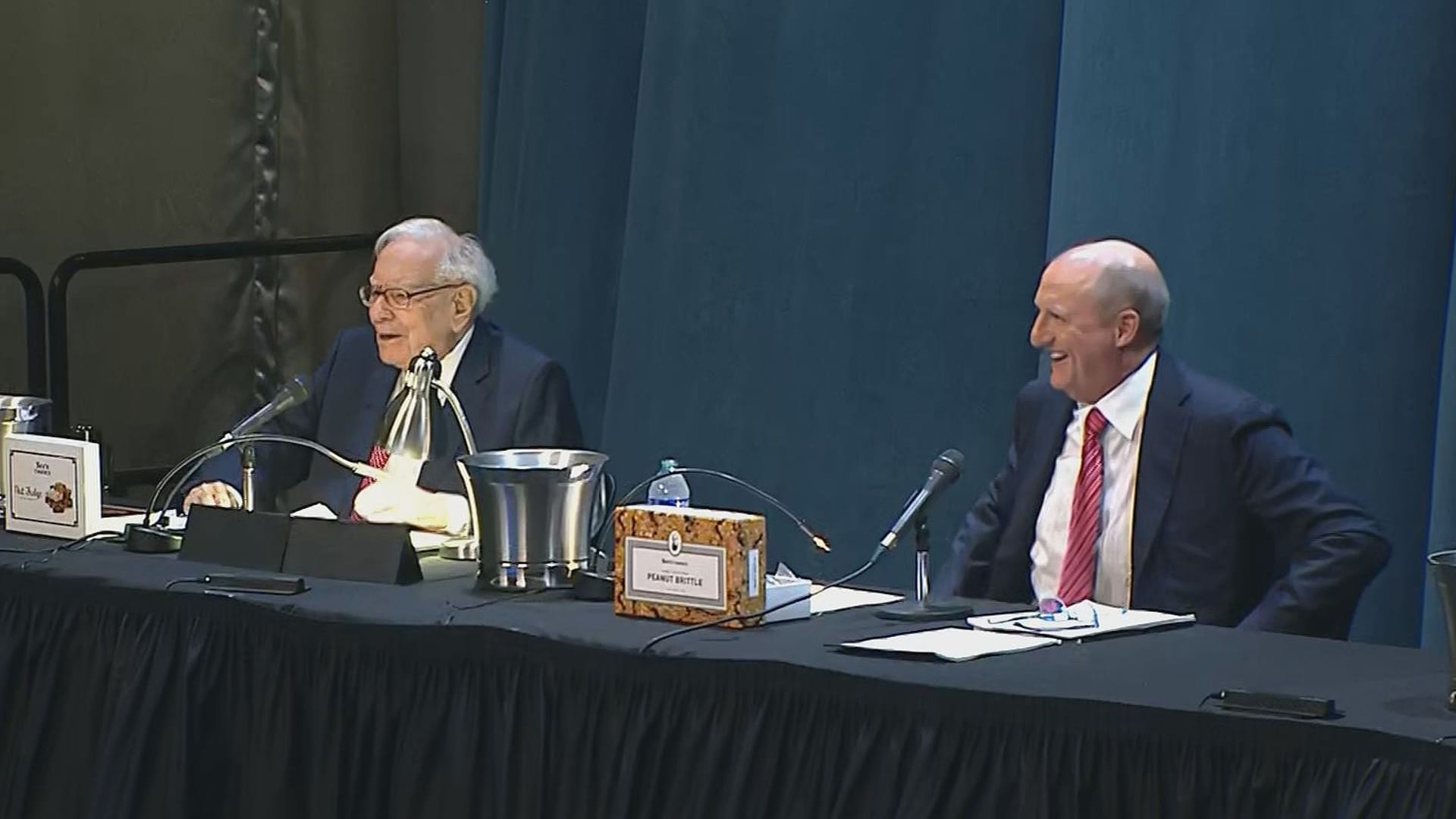
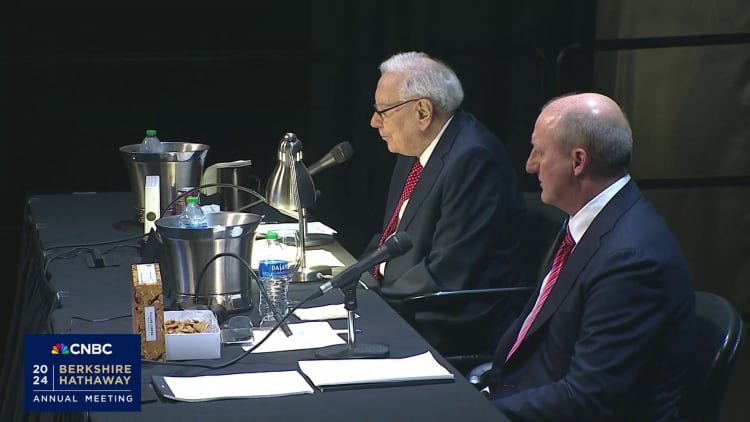
OMAHA, Nebraska — Warren Buffett said Saturday his designated successor Greg Abel will have the final say on Berkshire Hathaway’s investing decisions when the Oracle of Omaha is no longer at the helm.
“I would leave the capital allocation to Greg and he understands businesses extremely well,” Buffett told an arena full of shareholders at Berkshire’s annual meeting. “If you understand businesses, you’ll understand common stocks.”
Abel, 61, became known as Buffett’s heir apparent in 2021 after Charlie Munger inadvertently made the revelation at the shareholder meeting. Abel has been overseeing a major portion of Berkshire’s sprawling empire, including energy, railroad and retail.
Buffett offered the clearest insight into his succession plan to date after years of speculation about the exact roles of Berkshire’s top executives after the eventual transition. The investing icon, who’s turning 94 in August, said his decision is influenced by how much Berkshire’s assets have grown.
“I used to think differently about how that would be handled, but I think that responsibility should be that of the CEO and whatever that CEO decides may be helpful,” Buffett said. “The sums have grown so large at Berkshire, and we do not want to try and have 200 people around that are managing a billion each. It just doesn’t work.”
Berkshire’s cash pile ballooned to nearly $189 billion at the end of March, while its gigantic equity portfolio has stocks worth a whopping $362 billion based on current market prices.
“I think what you’re handling the sums that we will have, you’ve got to think very strategically about how to do very big things,” Buffett added. “I think the responsibility ought to be entirely with Greg.”
While Buffett has made clear that Abel would be taking over the CEO job, there were still questions about who would control the Berkshire public stock portfolio, where Buffett has garnered a huge following by racking up huge returns through investments in the likes of Coca-Cola and Apple.
Berkshire investing managers, Todd Combs and Ted Weschler, both former hedge fund managers, have helped Buffett manage a small portion of the stock portfolio (about 10%) for about the last decade. There was speculation that they may take over that portion of the Berkshire CEO role when he is no longer able.
But it seems, based on Buffett’s latest comments, that Abel will have final decisions on all capital allocation — including stock picks.
“I think the chief executive should be somebody that can weigh buying businesses, buying stocks, doing all kinds of things that might come up at a time when nobody else is willing to move,” Buffett said.
Abel is known for his strong expertise in the energy industry. Berkshire acquired MidAmerican Energy in 1999 and Abel became CEO of the company in 2008, six years before it was renamed Berkshire Hathaway Energy in 2014.
Correction: Berkshire’s equity portfolio is worth $362 billion. A previous version misstated the figure.
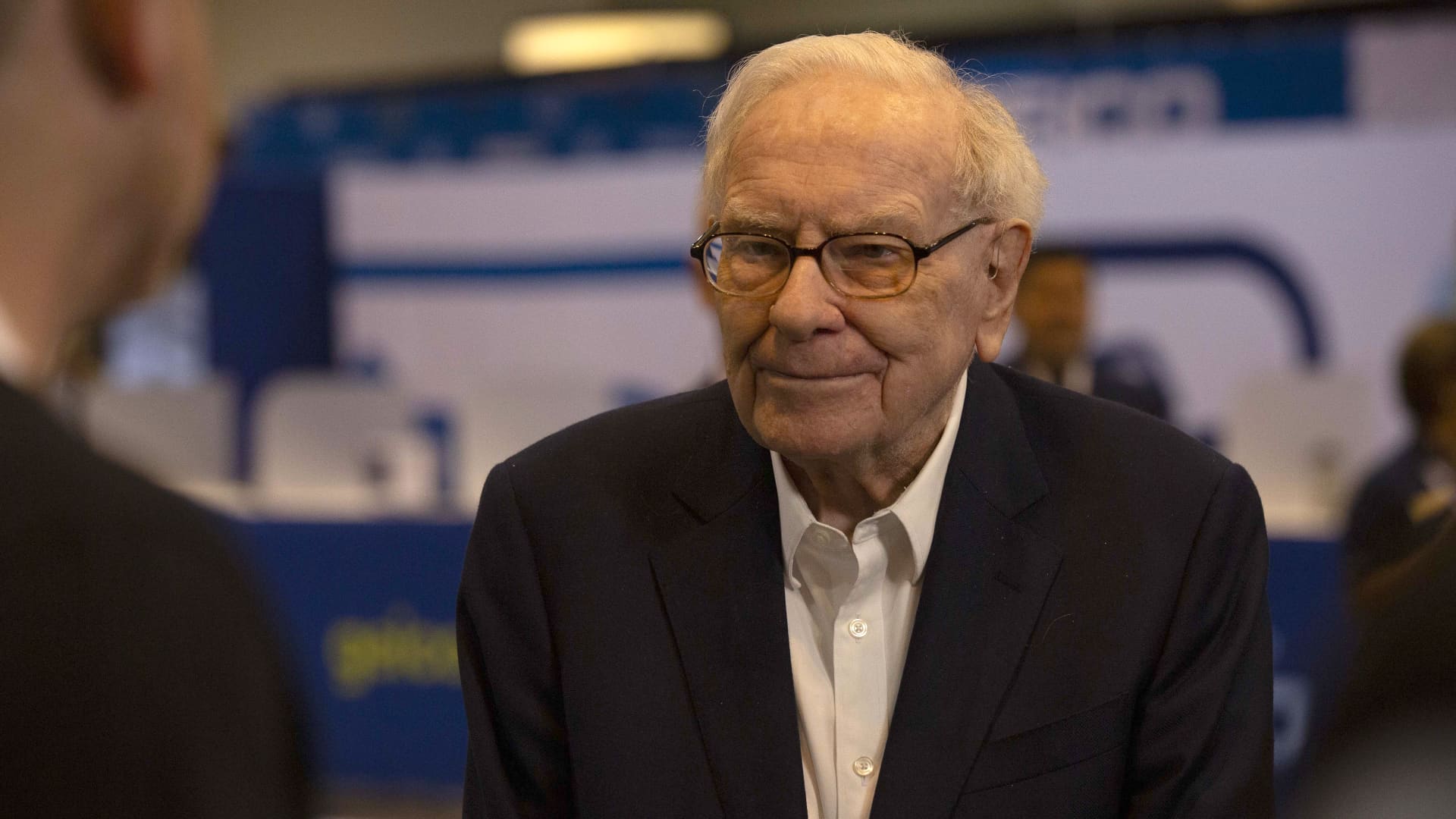
Warren Buffett walks the floor ahead of the Berkshire Hathaway Annual Shareholders Meeting in Omaha, Nebraska on May 3, 2024.
David A. Grogen | CNBC
OMAHA, Neb. — Warren Buffett revealed that he dumped Berkshire Hathaway’s entire Paramount stake at a loss.
“I was 100% responsible for the Paramount decision,” Buffett said at Berkshire’s annual shareholder meeting. “It was 100% my decision, and we’ve sold it all and we lost quite a bit of money.”
Berkshire owned 63.3 million shares of Paramount as of the end of 2023, after cutting the position by about a third in the fourth quarter of last year, according to latest filings.
The Omaha-based conglomerate first bought a nonvoting stake in Paramount’s class B shares in the first quarter of 2022. Since then the media company has had a tough ride, experiencing a dividend cut, earnings miss and a CEO exit. The stock declined 44% in 2022 and another 12% in 2023.

Paramount
Just this week, Sony Pictures and private equity firm Apollo Global Management sent a letter to the Paramount board expressing interest in acquiring the company for about $26 billion. The firm has also been having takeover talks with David Ellison’s Skydance Media.
Paramount has struggled in recent years, suffering from declining revenue as more consumers abandon traditional pay-TV, and as its streaming services continue to lose money. The stock is in the red again this year, down nearly 13%.
Buffett said the unfruitful Paramount bet made him think more deeply about what people prioritize in their leisure time. He previously said the streaming industry has too many players seeking viewer dollars, causing a stiff price war.
Finance
Warren Buffett says Berkshire Hathaway is looking at an investment in Canada
Published
2 weeks agoon
May 4, 2024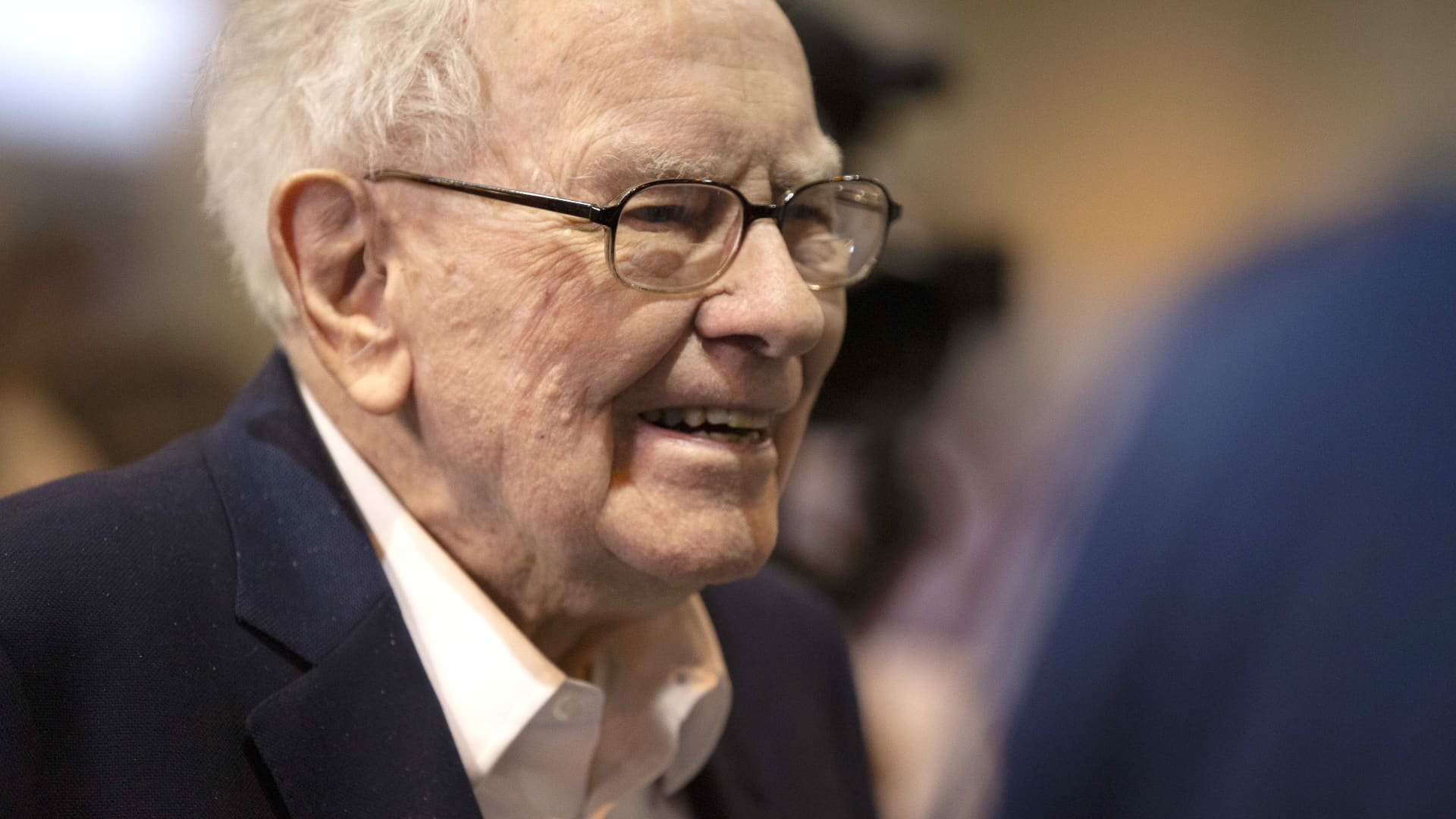
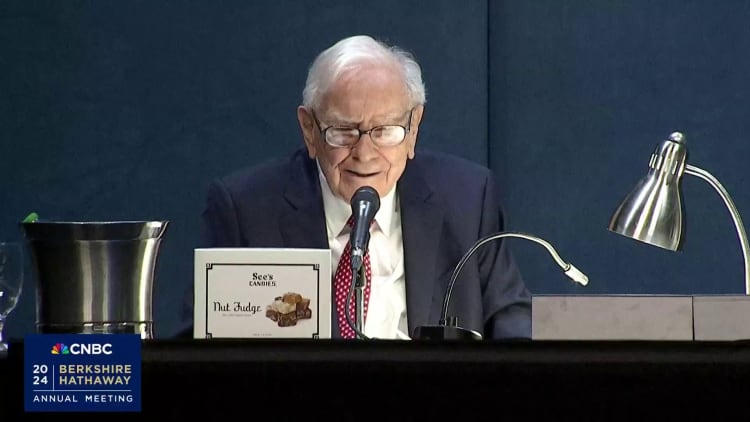
OMAHA, Neb. — Warren Buffett said that Berkshire Hathaway is looking into an investment in Canada.
“We do not feel uncomfortable in any shape or form putting our money into Canada,” he told an arena full of investors Saturday. “In fact, we’re actually looking at one thing now.”
The billionaire investor has placed bets in the country in the past. He’s previously taken a roughly $300 million position in Home Capital Group that investors took as a vote of confidence in the troubled Canadian mortgage underwriter.
The “Oracle of Omaha” said during the annual shareholder meeting that he does not expect to make significant bets outside the U.S., saying his recent investments in Japanese trading houses were a compelling exception. But Buffett noted the similarity in operations between the Canada and the U.S.
“There’s a lot of countries we don’t understand at all,” Buffett said. “So, Canada, it’s terrific when you’ve got a major economy, not the size of the U.S., but a major economy that you feel confident about operating there.”
Warren Buffett walks the floor and meets with Berkshire Hathaway shareholders ahead of their annual meeting in Omaha, Nebraska on May 3rd, 2024.
David A. Grogen | CNBC
Buffett did not reveal the specific company he’s looking at north of the border or whether it was public or private.
“Obviously, there aren’t as many big companies up there as there are in the United States,” Buffett said. “There are things we actually can do fairly well that Canada could benefit from Berkshire’s participation.”
Canada’s S&P/TSX Composite Index is up about 5% this year. The economy has large financial and commodity industries.
The Berkshire Hathaway shareholder meeting is exclusively broadcast on CNBC and livestreamed on CNBC.com.
More from Berkshire Hathaway’s Annual Meeting

Betting on the Kentucky Derby? Here’s how to think like a professional handicapper.

Warren Buffett says Greg Abel will make Berkshire Hathaway investing decisions when he’s gone

EV makers win 2-year extension to qualify for tax credits

Are American progressives making themselves sad?

‘Best Firms for Tech’ 2024 deadline extended to April 10

